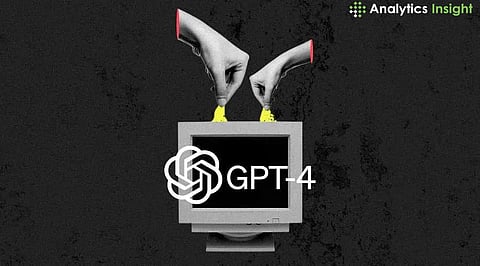

Open AI has evolved by leaps and bounds following the launch of its chatbot, ChatGPT. Now, churning text is not just dedicated to a function; it also creates lucrative images using natural prompts with the integration of DALL-E.
Apart from image generation, there are times when one has to convert an image of an old page from a book. Analyzing pictures manually is a time-consuming process, and that is where GPT-4 Vision comes in handy.
In September 2023, OpenAI launched a couple of functions aimed at improving interaction with GPT-4, such as the ability to ask questions about images and use speech as an input for queries. In November, OpenAI launched the API of GPT-4 with Vision, too.
GPT-4V, also called GPT-4 Vision, enables a user to let GPT-4 comprehend an image. The study says that OpenAI views bringing new modalities (like image inputs) into the large language models (LLMs) as an essential stage of AI development.
OpenAI has considered GPT-4 Vision as moving a step in the direction of developing their chatbot to be multimodal, i.e., an AI model with text, images, and audio as inputs. It can take an image as input and ask any question about it. This part is referred to as visual question answering (VQA). GPT-4 Vision is a Large Multimodal or LMM model, which is a model that takes in information from more than one modality, like text and images or text and audio, and generates outputs based upon them. This is not the only LMM. There are other various LLMs, including CogVLM, LLaVA, Kosmos-2, etc. LMMs are also called Multimodal Large Language Models (MLLMs).
GPT-4 Vision has some unique capabilities, such as processing any visual content, including screenshots, pictures, and documents. The latest iteration of GPT-4 Vision performs a slew of tasks, such as interpreting and analyzing data displayed in charts and graphs and identifying objects placed in images.
The GPT-4 Vision also has the capability of interrupting printed and handwritten texts within images. This leap in AI bridges the gap between textual analysis and visual understanding.
According to Indian Express, GPT-4 Vision can be a handy tool for web developers, researchers, content creators, and data analysts. By integrating advanced language models with visual capabilities, GPT-4 Vision assists in academic research and interrupting manuscripts and other historic documents. Using GPT-4 Vision, users can convert images and documents in just seconds and refine the results multiple times for detailed accuracy.
Another thing with GPT-4 Vision is if developers have a picture of a website's mockup, they can now write a series of code that would actually make the site. As a matter of fact, it all can be from either an accurate picture or a sketch. This model can code a website prototype by taking information from paper and creating a code for it. Humanizing the sentence: Data visualization and graphics are other places where the model will do a good job, and the user will unlock insights because of them.
The closing point of the idea is that the fusion of GPT-4 Vision and DALL-3 allows people to express their creativity by making up novel content for social media that draws the connection between the substance and the social layers.
OpenAI has promoted the fact that GPT-4 represents a considerable increase in the product's precision and reliability, yet it isn't flawless. There can be a mistake, just the model. Thus, it is helpful to authenticate the content continuously. GPT-4 Vision, the humanizing feature, continues the process of its maker reinforcing bias and worldview, the same as the markup GPT-3.
Another limitation is that the model is equipped in such a way that discriminating individual people in images will not be possible (or 'rejected' act in design). The OpenAI company refers to this as 'declination' behavior. The Corporation has recommended restricting it from operations aiming at diagnosis, treatment, and the kinds of investigation that require a lot of accuracy since the language is still in the developmental phase.
Now, we will give you some information to counter the drawbacks and risks of using the GPT-4 Vision.
OpenAI spent several months for the GPT-4 launch in March 2023, evaluating it not only internally but also externally and outlining the GPT drawbacks, which they have listed in its documentation.
As the GPT-4 Vision is developed, the biases and prejudices before are upgraded, including the negative and subjugating categorization of certain marginalized groups. As a result, this limitation should be thoroughly understood, and other adjustments should be made to prevent the bias from persisting within the use case and not depend solely on the model to deal with the bias.
Another drawback in this area is the use of data to train models unless opted out; therefore, while talking to the model, it's vital to avoid sharing any delicate or private data. They may also have the option of opting out of the shared data for improving the models in "Data Controls" by going to the "Settings & Beta section. "
GPTv-4 Vision cannot answer questions in which we need to identify specific individuals in an image. The designer intended this to be a natural stance to look refusing. Moreover, OpenAI recommends continuing the use of GPT -4 Vision for low-risk tasks.
Join our WhatsApp Channel to get the latest news, exclusives and videos on WhatsApp
_____________
Disclaimer: Analytics Insight does not provide financial advice or guidance on cryptocurrencies and stocks. Also note that the cryptocurrencies mentioned/listed on the website could potentially be risky, i.e. designed to induce you to invest financial resources that may be lost forever and not be recoverable once investments are made. This article is provided for informational purposes and does not constitute investment advice. You are responsible for conducting your own research (DYOR) before making any investments. Read more about the financial risks involved here.
